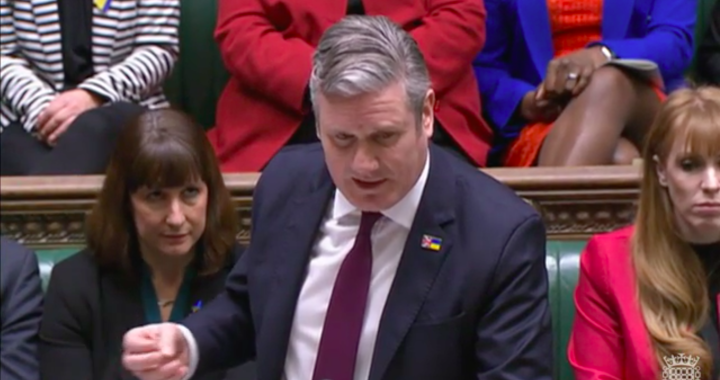Prime Minister’s Questions was very much not the main event today, with MPs looking forward to Volodymyr Zelensky’s address in Westminster Hall afterwards. Keir Starmer kept his questions to the theme of UK political unity in supporting Ukraine in their fight against Russia, while SNP leader Stephen Flynn used his two questions to ridicule the interventions made by Liz Truss.
Starmer appeared to have three aims with his questions. The first was to leave Zelensky in no doubt that Labour was as supportive of his fight against Putin as the Conservative party. He used soaring rhetoric about standing on the shoulders of giants to ‘support Ukraine’s fight for freedom’ and repeatedly talked about the whole house agreeing on this.
Sunak and Starmer benefitted from the exchanges, which shows they were made with true unity in mind
The second was to assert the kind of Labour party Starmer was leading. He talked about the ‘unshakeable’ commitment Labour had to Nato. This is something that would have been entirely unremarkable for most of the party’s history, had it not been for the leadership of Jeremy Corbyn.
The final purpose of Starmer’s six questions was to extract some commitments from Sunak on bringing Putin and his cronies to justice. Starmer asked whether the Prime Minister wanted to see Putin standing trial in The Hague, to which Sunak agreed and said he expected to see the first indictments soon. He also suggested that Russia be made to pay for the reconstruction of Ukraine using the wealth that is currently being held back by economic sanctions. The Prime Minister replied that funds that are in the UK will be put aside for reconstruction. Sunak repeatedly told the Chamber that Britain was leading the way in its support for Ukraine and its contribution to Nato, including through rising defence spending.
Both men benefitted from the exchanges, which shows they were made with true unity in mind, rather than the sort that begins with an opposition leader saying ‘in the spirit of unity…’ before spending six questions attacking the government. Sunak managed to deal with Flynn’s more partisan approach reasonably well: the SNP’s Westminster leader quoted The Spectator’s interview with Liz Truss where she said she did not regret her time in office, and asked Sunak whether he did. This inevitably provoked laughter in the Chamber, while Sunak said he was grateful for the contribution all his predecessors had made to public life.
Pressed on this further in Flynn’s second question, Sunak repeated his ‘mistakes were made’ line from his address on the first day as PM. Then he was able to move on – easier to do so after just two questions in the Commons than in an election campaign when voters may well still be quite angry with Truss and her party for what happened.







Comments